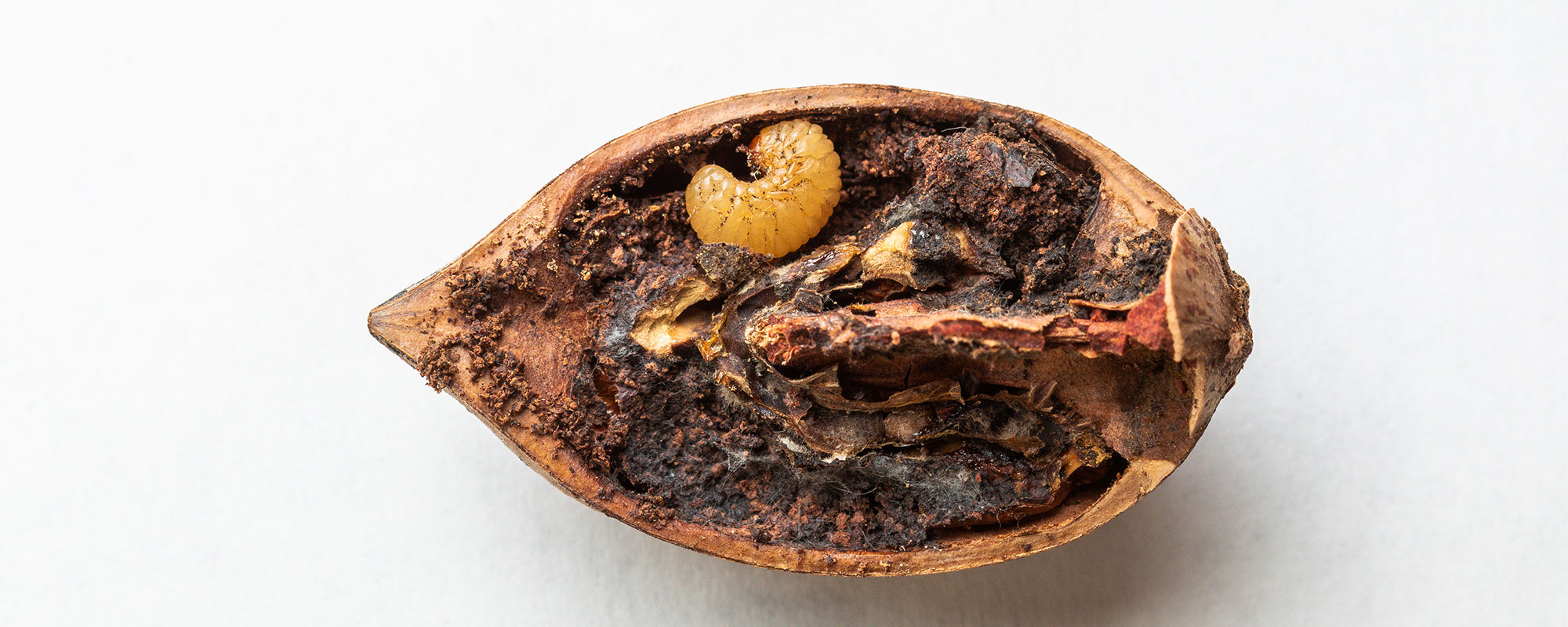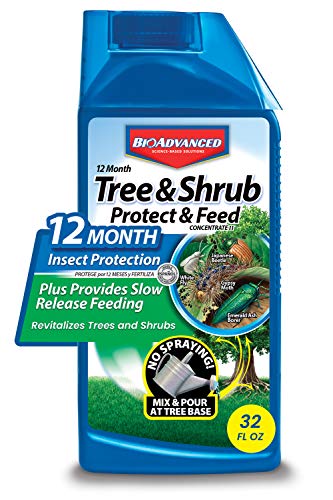Insecticide For Pecan Trees
Pecan trees are common in eastern North Carolina. One of the most devastating insects on pecans is the pecan weevil. Pecan weevils damage nuts in two ways. First, they feed on the young nuts in late summer, causing some to drop early still in their husks and never complete development. Second, they lay their eggs inside the pecans still on the tree. Within a few days, cream-colored grubs hatch from these eggs and begin feeding on the nut. By the time the pecan drops to the ground, the grub has eaten most of the nut. Then they drill a small hole in the top of the shell and crawl out. If you have ever picked up pecans that had a hole in the top of the shell and were empty or found grubs inside pecans when you cracked them open, then you have experienced pecan weevils. Though their damage will not become evident until later in the year, now is the time to control this pest.
The life cycle of the pecan weevil has four stages. Pupae develop underground. They remain in the soil for one to two years. Adult weevils emerge from the soil from August through September, usually coming out after significant rain. The female chews holes into the nut and then lays her eggs. The larvae hatch and feed on the nut. After reaching maturity the larvae leave the nut falling to the ground where they burrow into the soil to pupate and emerge as an adult the next August. It is a continuous cycle with one generation taking one to three years. If you have a pecan tree whose nuts have been damaged by pecan weevil in the past two years it is most likely your tree will be damaged again this year. So you need to take control measures.
Pecan weevils can be controlled by spraying liquid applications of carbaryl (commonly sold as Sevin) on the ground underneath trees out to the drip line, as well as up the trunks of pecan trees as far as you can reach, beginning in mid-August and continuing every seven days through mid to late September. Dust forms of Sevin (carbaryl) are not as effective as liquid sprays for controlling pecan weevil. This control method will greatly reduce the number of nuts lost to pecan weevil. To minimize the number of sprays needed, pecan tree owners can monitor weevil populations by tying burlap cloth around the trunks of pecan trees in layers. Check the burlap each day for weevils and begin spraying when they are found. Pecan weevils are a type of beetle. The adults are brown in color and less than ½” long, with a long, narrow, curved snout protruding from the front of their bodies. Stop spraying when weevils are no longer found on a regular basis. Later in the season, when mature nuts begin to fall, pick up pecans daily and discard infested nuts away from the tree to lower future weevil populations.
You can also use Tanglefoot a sticky substance painted on the base of the tree to monitor and trap some beetles. As with all insecticides, follow the label recommendations. Pecan scab is another common and severe pecan problem in our area. This fungal disease causes leaves and shucks to become covered in black spots. Severely infested shucks will not properly release pecan nuts. Tree’s whose leaves are covered in spots often have poorly filled out nuts. Treating for scab is not practical for most homeowners and requires several fungicide applications starting in early summer. Fungicides must be sprayed throughout the tree, which requires special equipment.
Overall, there are little homeowners can do to reduce scab disease in established pecan trees. When planting new trees, always select varieties resistant to scab, such as Cape Fear, Sumner, or Elliot. Other common pecan problems include poor pollination, biennial bearing (bearing a heavy crop one year and little to no crop the next year), and stink bug damage, which causes dark bitter spots to develop on the nuts. Fall webworms also commonly feed on pecan trees, forming large tent-like webs on the ends of branches. Webworms typically are a cosmetic issue on larger trees. On small trees, you can prune or knock the web out.
Read more at: https://wilson.ces.ncsu.edu/2014/08/pecan-pests/
Insecticide For Pecan Trees
Pecan trees are a popular choice for home and farm owners, but they are also susceptible to problems like scale insects and other pests. While there are many different types of products available on the market, it is important to know what kind of insect you are dealing with before you buy your insecticide.
The most common type of scale insect found on pecan trees is the pecan scurfy scale. This type of scale can be identified by its rough texture and reddish coloration. The best way to get rid of this type of pest is with a horticultural oil spray; however, if this does not work then try using an insecticidal soap solution instead.
In addition to pecan scurfy scales, there are other types of scale insects that can affect your pecan tree as well: Asian longhorned beetle larvae, black pecan aphid larvae, and brown soft scales (these two last ones being more common in Texas than other parts).
List Of Insecticide For Pecan Trees
- INSECT KILLER – This pest control is great for use on adelgids, aphids, bronze birch borers, emerald ash borer, leaf miners, scale, and many other species of bug. Will also prevent new infestations.
- SOIL DRENCH APPLICATION – Concentrate dissolves in water allowing the insecticide to move through the root zone. Once in the roots, it moves up through the tree or shrub providing protection from insects. Also provides protection for new growth.
- FOLIAGE PROTECTOR – Designed for use on listed fruit, nut and ornamental trees and shrubs.
- WON’T WASH AWAY – Tree and Shrub Insect Control is rainproof within hours. For best results, spray with enough time for it to completely dry before it rains. Will not wash off after it has dried.
- EASY APPLICATION – Product quickly mixes with water and should be applied by pouring or with backpack, compression, knapsack or tank type sprayers. Carefully read and use according to label directions.
Additional Info :
| Color | LAWNGARD |
| Item Dimensions | |
| Height | 11.8 Inches |
| Width | 7.5 Inches |
| Length | 4.5 Inches |
| Weight | 8.2 Pounds |
- 12 MONTH PROTECTION: With just one application, kills listed insects and prevents new infestations for up to a year
- INSECT & PEST KILLER: Kills Japanese Beetles, Emerald Ash Borers, Adelgids, Leafminers, Aphids, Caterpillars, and more
- SLOW-RELEASE FERTILIZER: Plant food and fertilizer improves the health of your trees and shrubs
- SYSTEMIC PROTECTION: Protects your potted and outdoor trees and shrubs from the roots to the stem of every leaf
- RESTRICTIONS: Product intended only for non-bearing fruit and nut trees. Non-bearing fruits and nuts are plants that do not bear edible fruits and nuts for at least 12 months after application of pesticides. Not for sale in NY, CT, MD & VT.
Additional Info :
| Color | Concentrate |
| Item Dimensions | |
| Height | 10.3 Inches |
| Width | 2.7 Inches |
| Length | 4.7 Inches |
| Weight | 2.3 Pounds |
- Size: 16 OZ
- Thuricide BT Caterpillar Control concentrate is used by organic gardeners and is made from bacteria that is toxic to listed pests.
- Safe to use on all plants, vegetables and edible crops.
- Very low toxicity to humans and pets.
- For large quantity discount consideration or to request a mixed multi-pack, please message us.
Additional Info :
| Item Dimensions | |
| Height | 6 Inches |
| Width | 1.75 Inches |
| Length | 4 Inches |
| Weight | 0.62 Pounds |
- For use on outdoor trees and shrubs, including listed fruit and nut trees
- Controls aphids, emerald ash borers, Japanese beetles, birch leaf miners and other listed insects for up to 12 months with one application
- Insecticide absorbed through the roots and into the plant for protection that won’t wash off
- Mix 1.47-percent Imidacloprid concentrate with water and pour evenly around the base of the tree or shrub
- For use on outdoor trees and shrubs, including listed fruit and nut trees
- Controls aphids, emerald ash borers, Japanese beetles, birch leaf miners and other listed insects for up to 12 months with one application
- Insecticide absorbed through the roots and into the plant for protection that won’t wash off
- Mix 1.47-percent Imidacloprid concentrate with water and pour evenly around the base of the tree or shrub
- Mix 1.47-percent Imidacloprid concentrate with water and pour evenly around the base of the tree or shrub
Additional Info :
| Item Dimensions | |
| Height | 11.88 Inches |
| Width | 7.5 Inches |
| Length | 4.25 Inches |
| Weight | 8.6 Pounds |
- Controls insects, diseases and mites
- Kills insect stages, including eggs, larvae and adult. Controls aphids, mealybugs, mites, scale, whiteflies, beetles and other listed insects
- Can be used up to day of harvest
- Prevents fungal attack of plant tissues
- For use on fruit and nut trees and ornamentals
Additional Info :
| Item Dimensions | |
| Height | 7.12 Inches |
| Width | 3.68 Inches |
| Length | 2.32 Inches |
| Weight | 1.1 Pounds |





